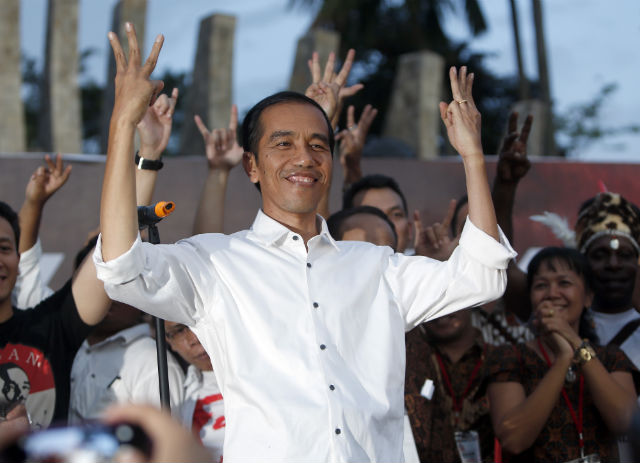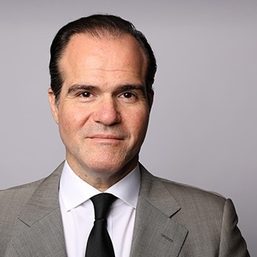SUMMARY
This is AI generated summarization, which may have errors. For context, always refer to the full article.

The election of Joko “Jokowi” Widodo in Indonesia is not just a victory for a maturing Indonesian democracy – a peaceful election whose fairness is not seriously doubted – probably even by the loser Prabowo Subianto, despite his allegations of fraud.
But the result has been noted around Asia, and beyond not just for the successful exercise of voting rights in the world’s third most populous democracy. It is the origin of the winning candidate, a man from a modest background who rose to the top because he was a successful leader of two cities, small Solo and giant Jakarta, and was perceived to be honest.
In the end these characteristics proved more telling than the family and elite connections and military background of his opponent. That has lessons for other countries. The most obvious ones for the likes of Myanmar and Cambodia are that genuine elections can produce change without chaos, provided that previous power holders are either willing to concede or that institutions are sufficiently responsive to the public not to allow elections to be stolen – as repeatedly happened in Thailand.
Indeed it has happened so often in Thailand that the military’s solution has been to abolish voting because of the embarrassment of having to nullify the results in the name of a king who appears incapable of speech and a crown prince incapable of being respected.
But perhaps the bigger lessons are for those countries which have free and mostly fair elections but where politics remain dominated by tainted, self-perpetuating dynasties and groups. India may have led the way, the crushing victory of Narendra Modi being as much a rejection of the Gandhi clan as the liking of a controversial, if dynamic, BJP figure. It remains to be seen if Modi can bring in new people as well as ideas to a rejuvenate a self-satisfied but out-of-touch New Delhi elite.
It remains to be seen too whether Congress can recover itself under a non-family leadership or will fall back on another member of the clan to try to revive its fortunes. But in India as in Indonesia, the election marks a break with dynastic politics.
They are thus reminders of the pitiful state of democratic politics in neighboring Philippines. President Benigno “Noynoy” Aquino was elected because of his name and respect for his parents. For 3 years he appeared to make most of the right decisions and give the impression of leading his country to a less corrupt, more dynamic future with social reform as well economic growth.
But his image is now tarnished by his disrespect for the constitutional process, a disrespect which probably comes from an assumption that the Aquino names and his own previous high standing would prevail. Not so. His confrontation with the Supreme Court has had a disastrous impact on his popularity and one which will limit his authority for his remaining time in office – his term ends in 2016.
So is there a Philippine Jokowi in sight? Absolutely not and yet one is needed at least as badly as Indonesia needed an alternative to Prabowo. As of now the leading contender to be next president is Vice President Jejomar Binay, 71. He not only lacks the reputation for personal integrity that Noynoy has enjoyed, he is a classic exponent of dynastic politics both at the local level (he was succeeded by wife and son as mayor of Makati, the richest city in the country) and at the national level a daughter who became a senator despite minimal experience in politics or government. Then there is the Marcos clan, who continue to be reelected ad infinitum despite the fact that the patriarch, the Ferdinand, stole billions from the treasury and generated a kleptomaniac class that ruined what had been a vibrant economy.
Next up for a desperately needed break from dynastic politics is Malaysia, where Najib Tun Razak is the son of one prime minister and an in-law of another, while leading figures in the ruling party include Hishamuddin Hussein, son of one prime minister and grandson of UMNO’s founder; Khairy Jamaluddin, son-in-law of another prime minister, Abdullah Badawi; and Mukhriz Mahathir, son Dr Mahathir.
Numerous other offspring of former UMNO bigwigs are found feeding at the great UMNO trough. The opposition too is prone to dynasties as well with Lim Kit Siang’s son running Penang and the DAP and Anwar Ibrahim’s wife and daughter both very active in his support.
In Bangladesh, democratic politics has for years been undermined by the dynastic appeal of two feuding women and their families, while in Sri Lanka family rule has replaced both party rule and real democracy with a dangerous and perverted pseudo-democracy.
Of course, dynastic politics is not exclusive to developing Asia. The US presents probably the worst case in the developed world with its Kennedys, Bushes and Clintons. At the state level in the US, gerrymandering of districts helps to secure dynastic succession. But at least some outsiders – like Barack Obama – still get to the top. Any number of wives have succeeded their dead husbands, including Mary Bono, who replaced her husband Sonny, the entertainer, after he ran head-on into a tree while skiing.
Singaporeans believe that Lee Hsien Loong has the good sense to keep his offspring and relatives out of succession plans and the PAP’s reputation for meritocracy is earned.
The Philippines and Malaysia are still very far from meritocracies that can throw up new leaders. Both clearly need such outsiders who can at least try to spread power to newer groups and individuals.
Jokowi will doubtless find it very difficult to combat the many vested and corrupt interests in parliament, the bureaucracy and among well protected business elites. But he will try and in doing so can become an inspiration both to quasi-democratic systems in urgent need of renewal and to those in Thailand, Myanmar and Cambodia who wish they had the same freedom of choice as 250 million Indonesians.
A 30-year resident of the region, Philip Bowring is Asia commentator for the International Herald Tribune and is the former editor of The Far Eastern Economic Review. This piece was first published on July 29, 2014 at Asia Sentinel.
Add a comment
How does this make you feel?


![[WATCH] Try This: Empanada Salteña from Argentina](https://www.rappler.com/tachyon/2023/04/try-this-empanada-saltena-argentina.jpg?resize=257%2C257&crop=765px%2C0px%2C1037px%2C1037px)


There are no comments yet. Add your comment to start the conversation.